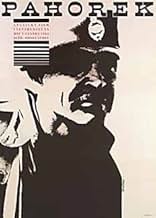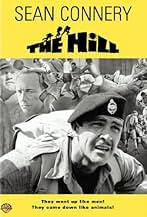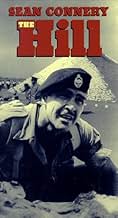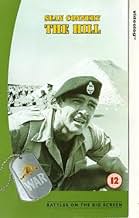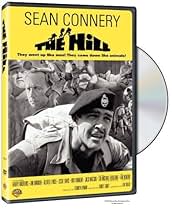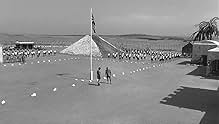VALUTAZIONE IMDb
7,8/10
15.995
LA TUA VALUTAZIONE
In una prigione militare nordafricana durante la seconda guerra mondiale, cinque nuovi prigionieri lottano per sopravvivere di fronte a punizioni brutali e guardie sadiche.In una prigione militare nordafricana durante la seconda guerra mondiale, cinque nuovi prigionieri lottano per sopravvivere di fronte a punizioni brutali e guardie sadiche.In una prigione militare nordafricana durante la seconda guerra mondiale, cinque nuovi prigionieri lottano per sopravvivere di fronte a punizioni brutali e guardie sadiche.
- Ha vinto 1 BAFTA Award
- 4 vittorie e 6 candidature totali
Michael Redgrave
- The Medical Officer
- (as Sir Michael Redgrave)
Michael Hawkins
- Prisoner
- (non citato nei titoli originali)
James Payne
- Man in Prison
- (non citato nei titoli originali)
Robert Royal
- Prisoner
- (non citato nei titoli originali)
Harold Sanderson
- Officer
- (non citato nei titoli originali)
Recensioni in evidenza
It isn't often Sean Connery makes a film which becomes more memorable than his efforts to make it. Such is the way with a few he decided not mention in his filmography, such as "Safu." You must see it to realize that despite Connery, the film must have a true message. Such is the case with "The Hill." This film does have a message and it is harsh, brutal and to the point. The setting is a British military prison located in the desert and stocked with ex-soldiers who've been court martialed and now must be repatriated by backbreaking discipline, and grim punishment. With inmates coming and going at the prison, it is not too difficult to imagine a new lot which includes Joe Roberts (Sean Connery) a broken Sgt. Major. Pvt. Jacko King (Ossie Davis, who is superb in this role) Pvt. Alfred Lynch, (George Stevens) Pvt. Monty Bartlett (Roy Kinnear) and Pvt. Jock McGrath (Jack Watson). These men and others are new inmates and are pitted against the ruling officers who, will receive as much as they give. This includes the governing Non-commission staff like, Royal Sgt. Major Bert Wilson (Harry Andrews, superb acting) and Sgt. Harris (Ian Bannen) who despite their station are set to collide with each other as well as with the prisoners. Upon entering the prison, the audience is allowed to see how the men will be affected as they are introduced to the punishing ordeal of . . . The Hill. ****
Hot and sweaty, bold and brutal, Sidney Lumet's The Hill is a tour de force of incarceration based cinema. Story has five new inmates sent to a North African based British Army Prison, the centre piece of which is a manufactured hill that is used as a punishment tool. The new recruits, headed by Joe Roberts (Sean Connery), quickly fall foul of the superiors, especially the venomous Staff Sergeant Williams (Ian Hendry), but these boys wont take it lying down...
With no music and Oswald Morris' monochrome photography ensuring atmosphere is perpetually claustrophobic, the harsh edges of the story strike hard. Be it overt bullying by those in charge - pushing men evidently too far - or racism, Lumet melds everything together superbly for harsh viewing experience, tightening the screws every quarter of film. Come the shattering conclusion it's a merciful release for the viewers, a chance to start breathing properly again, even if your mind is ablaze with a number of thoughts.
This is very much an actors picture, which seems a given since it's adapted by Ray Rigby from his own play, but a mightily strong cast do sterling work with the tinderbox screenplay. Ossie Davis, Harry Andrews, Ian Bannen, Roy Kinnear, Alfred Lynch and Michael Redgrave fill out the other key roles, each giving their characters vivid depth without resorting to histrionics and scenery chewing. Which of course is a testament to Lumet's skills as a director of actors.
Slow burning intensity bristles with the corrosive nature of machismo fuelled authority, an unforgettable film and highly recommended to those who have not sampled it yet. 9/10
With no music and Oswald Morris' monochrome photography ensuring atmosphere is perpetually claustrophobic, the harsh edges of the story strike hard. Be it overt bullying by those in charge - pushing men evidently too far - or racism, Lumet melds everything together superbly for harsh viewing experience, tightening the screws every quarter of film. Come the shattering conclusion it's a merciful release for the viewers, a chance to start breathing properly again, even if your mind is ablaze with a number of thoughts.
This is very much an actors picture, which seems a given since it's adapted by Ray Rigby from his own play, but a mightily strong cast do sterling work with the tinderbox screenplay. Ossie Davis, Harry Andrews, Ian Bannen, Roy Kinnear, Alfred Lynch and Michael Redgrave fill out the other key roles, each giving their characters vivid depth without resorting to histrionics and scenery chewing. Which of course is a testament to Lumet's skills as a director of actors.
Slow burning intensity bristles with the corrosive nature of machismo fuelled authority, an unforgettable film and highly recommended to those who have not sampled it yet. 9/10
Stark images, powerful script and performances, and rapid, sharp editing make this film difficult to forget. Director Sidney Lumet stamps his authority on the movie with a style that is gritty, almost documentary -like. The quick cuts are precise, like the snap of the salutes and the bark of the NCO's. Beyond Lumet's towering presence, there is a likeable performance from a young Ossie Davis, an excellent early non-Bond performance from Sean Connery, and Harry Andrews' Sargeant-Major is a remarkable creation - a little man whose job is to destroy these misfits on behalf of a system that will not tolerate individuals.
This remarkable film stays in the mind long after viewing for me, mainly because it announces early on that it is not an easy picture, and like early Frankenheimer, it's aggressive style stands out from the norm. It is a quintessential sixties picture - a time when experiments in style could be taken seriously - not just a smirky in-jokes or cartoonish roller -coaster rides. Exhilarating nonetheless.
This remarkable film stays in the mind long after viewing for me, mainly because it announces early on that it is not an easy picture, and like early Frankenheimer, it's aggressive style stands out from the norm. It is a quintessential sixties picture - a time when experiments in style could be taken seriously - not just a smirky in-jokes or cartoonish roller -coaster rides. Exhilarating nonetheless.
One of Sean Connery's personal favorites among his movies is The Hill. He had high hopes for its success and that it would break him out of the James Bond mold. Unfortunately the movie going public wanted more James Bond and less Sean Connery at this point.
The Hill is close to a perfect masterpiece of characterization and cinematography. Director Sidney Lumet opted for black and white in making The Hill and I think it enhances the stark surroundings of the British military stockade in North Africa. These are really the forgotten people of World War II.
If Sean Connery could have gotten a chance for a Dirty Dozen type mission from the British army he would have taken it. His character is very similar to Charles Bronson's from that film. Bronson was an officer, Connery a sergeant major, Bronson shot, Connery struck a superior with extremely good cause, but their respective armies didn't see it that way.
So now Sean is in a cell with four other prisoners all of varying character, Roy Kinnear, Ossie Davis, Jack Watson, and Alfred Lynch. Norman Bird is the commandant, but the camp is really run as in all armies by the Sergeant-Major Harry Andrews. Andrews has a special punishment for the prisoners, called The Hill; a specially constructed mound of sand about 200 feet high where they have to run up and down it with field pack in the desert heat.
Andrews has the assistance of Staff Sergeant Ian Hendry who has his own sadistic bent quite apart from military punishment. When one of Connery's cell-mates dies from punishment, all hell threatens to break loose.
One of the things that attracted Sean Connery to this film according to the Citadel Film series book on his work was the fact that it was unlike James Bond, no glamorous locations, no fancy wardrobe and absolutely no romance. This would give him the chance to show he could be something other than James Bond.
Connery got rave reviews for playing former Sergeant Major Joe Roberts in The Hill and the rest of the cast Sidney Lumet assembled did likewise. Unfortunately the film failed at the box office. Connery remarked that without his name on it, this would have been an art house special limited release type of work. But the public only wanted to see James Bond and it wasn't until The Anderson Tapes that Sean Connery finally got great reviews in a film that did well at the box office as well as the critics.
Over 40 years after it was released The Hill now is considered a cinema masterpiece. Besides Connery my favorite performances are from Michael Redgrave as the medical officer who's not a strong man, but steps to the plate when his duty is clear and from Ossie Davis as a cynical black soldier who finally grows tired of the institutional racism he finds and 'leaves' the army. You won't forget them, Connery or The Hill once you see it.
The Hill is close to a perfect masterpiece of characterization and cinematography. Director Sidney Lumet opted for black and white in making The Hill and I think it enhances the stark surroundings of the British military stockade in North Africa. These are really the forgotten people of World War II.
If Sean Connery could have gotten a chance for a Dirty Dozen type mission from the British army he would have taken it. His character is very similar to Charles Bronson's from that film. Bronson was an officer, Connery a sergeant major, Bronson shot, Connery struck a superior with extremely good cause, but their respective armies didn't see it that way.
So now Sean is in a cell with four other prisoners all of varying character, Roy Kinnear, Ossie Davis, Jack Watson, and Alfred Lynch. Norman Bird is the commandant, but the camp is really run as in all armies by the Sergeant-Major Harry Andrews. Andrews has a special punishment for the prisoners, called The Hill; a specially constructed mound of sand about 200 feet high where they have to run up and down it with field pack in the desert heat.
Andrews has the assistance of Staff Sergeant Ian Hendry who has his own sadistic bent quite apart from military punishment. When one of Connery's cell-mates dies from punishment, all hell threatens to break loose.
One of the things that attracted Sean Connery to this film according to the Citadel Film series book on his work was the fact that it was unlike James Bond, no glamorous locations, no fancy wardrobe and absolutely no romance. This would give him the chance to show he could be something other than James Bond.
Connery got rave reviews for playing former Sergeant Major Joe Roberts in The Hill and the rest of the cast Sidney Lumet assembled did likewise. Unfortunately the film failed at the box office. Connery remarked that without his name on it, this would have been an art house special limited release type of work. But the public only wanted to see James Bond and it wasn't until The Anderson Tapes that Sean Connery finally got great reviews in a film that did well at the box office as well as the critics.
Over 40 years after it was released The Hill now is considered a cinema masterpiece. Besides Connery my favorite performances are from Michael Redgrave as the medical officer who's not a strong man, but steps to the plate when his duty is clear and from Ossie Davis as a cynical black soldier who finally grows tired of the institutional racism he finds and 'leaves' the army. You won't forget them, Connery or The Hill once you see it.
This was one of the most poinant lines of the film, neatly summarising the general mood and feeling of the characters.
A lot of people think that this is an anti-war film, which to some degree it is. More accurately, however, it could be labelled an anti-army film. Interestingly enough both views could be maintained without there being any real warfare displayed on the screen. This is a measure of how powerful the film is.
The fighting which we see is actually between the various prison officers and convicts. The film does not simply divide them into opposing groups, but rather explores the differences and tensions between the people who are in power and those who are subject to it.
Like 'Full Metal Jacket', many years later, this movie is a condemnation of the dehumanising process soldiers are forced to go through in order to survive the army. Military prison, as we learn, is a further step down into the merciless and brutal world of the army.
If 'The Hill' was made today, the violence we see would undoubtedly be more explicit and obvious. However, this does not take away anything from the original , as it is the mental torture more than the physical suffering which is portrayed so well in Lumet's work.
It has aged fairly well, mainly due to the accomplished and original way the film is shot and the script is written. Camera angles to induce feelings of dominance, claustrophobia and pressure are utilised perfectly as are the varying degrees of light and dark contrast which accentuates the blazing sun. Every actor is well cast and gives well judged performances, most career bests. Those that stand out are Bannen, Hendry, Connery and Andrews.
At the core of the film is the struggle between Andrews and Bannen's respective characters for ultimate authority in the prison. The bittersweet ending shows that Andrews' charcter, although shaken, will still reign in the hellhouse of a military prison.
Superb, thought provoking film, that rewards the viewer for staying with it as the powerful ending is reached.
A lot of people think that this is an anti-war film, which to some degree it is. More accurately, however, it could be labelled an anti-army film. Interestingly enough both views could be maintained without there being any real warfare displayed on the screen. This is a measure of how powerful the film is.
The fighting which we see is actually between the various prison officers and convicts. The film does not simply divide them into opposing groups, but rather explores the differences and tensions between the people who are in power and those who are subject to it.
Like 'Full Metal Jacket', many years later, this movie is a condemnation of the dehumanising process soldiers are forced to go through in order to survive the army. Military prison, as we learn, is a further step down into the merciless and brutal world of the army.
If 'The Hill' was made today, the violence we see would undoubtedly be more explicit and obvious. However, this does not take away anything from the original , as it is the mental torture more than the physical suffering which is portrayed so well in Lumet's work.
It has aged fairly well, mainly due to the accomplished and original way the film is shot and the script is written. Camera angles to induce feelings of dominance, claustrophobia and pressure are utilised perfectly as are the varying degrees of light and dark contrast which accentuates the blazing sun. Every actor is well cast and gives well judged performances, most career bests. Those that stand out are Bannen, Hendry, Connery and Andrews.
At the core of the film is the struggle between Andrews and Bannen's respective characters for ultimate authority in the prison. The bittersweet ending shows that Andrews' charcter, although shaken, will still reign in the hellhouse of a military prison.
Superb, thought provoking film, that rewards the viewer for staying with it as the powerful ending is reached.
Lo sapevi?
- QuizFilming took place in Almería, Spain in a sandy wasteland called Cabo de Gata starting in September 1964 for five weeks on location. An old Spanish fort in Málaga was used for the prison.
Many people associated with the production had regarded the filming as pleasant, despite difficult conditions---The temperatures rarely fell below 115 degrees Fahrenheit (46 degrees Celsius), and despite the 2,000 gallons of pure water that were shipped in for the crew, almost everyone succumbed to dysentery during the shoot.
- BlooperThe first time the new arrivals are shown around "the hill" by Staff Williams, the shadow of the rig is clearly visible as the camera performs a 360 degree shot from the top of the hill.
- Citazioni
Trooper Joe Roberts: We're all doing time. Even the screws.
- Versioni alternativeColorized version was broadcast over TNT Network June 7, 1989.
- ConnessioniFeatured in The Sun... the Sand... the Hill. (1965)
I più visti
Accedi per valutare e creare un elenco di titoli salvati per ottenere consigli personalizzati
- How long is The Hill?Powered by Alexa
Dettagli
Botteghino
- Budget
- 2.500.000 USD (previsto)
- Tempo di esecuzione2 ore 3 minuti
- Colore
- Proporzioni
- 1.85 : 1
Contribuisci a questa pagina
Suggerisci una modifica o aggiungi i contenuti mancanti

Divario superiore
What is the Japanese language plot outline for La collina del disonore (1965)?
Rispondi

